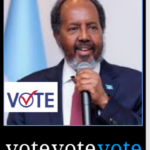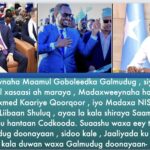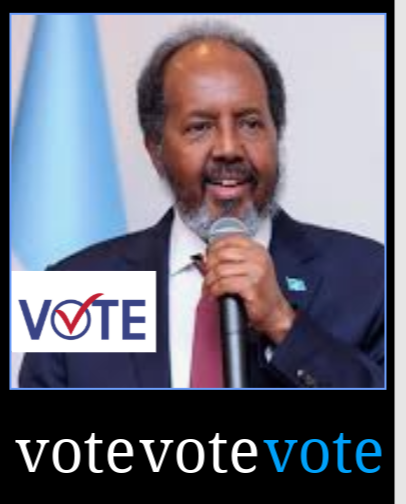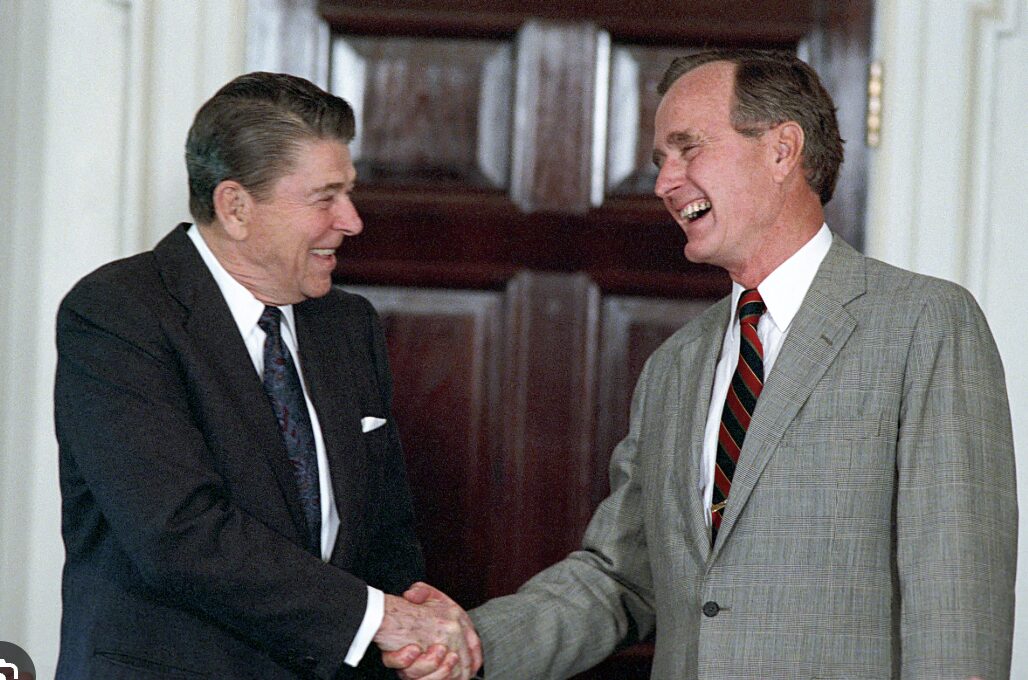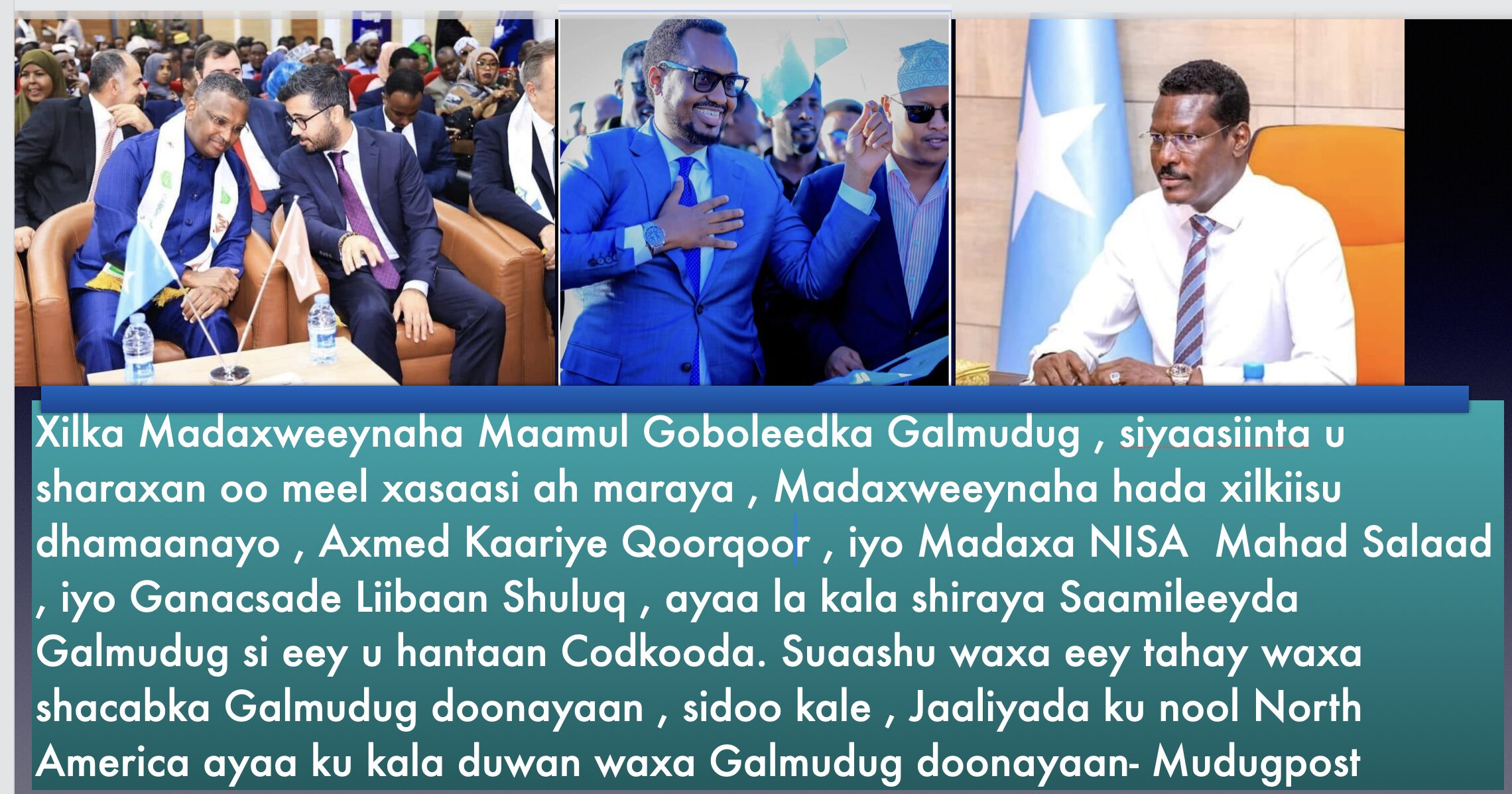By Dr. Abdikasim Ali, MHS, PhD
The ongoing political rift, mismanagement, and deepening friction between Somalia’s regional states—particularly between Jubaland’s leader, Ahmed Madoobe, Puntland’s leader, Said Deni, and the federal government under President Hassan Sheikh Mohamud—are creating a situation that risks the fragmentation of the country. This internal division, exacerbated by the lack of cohesive leadership, threatens to push Somalia toward further disintegration, with the formal recognition of Somaliland becoming an increasingly likely outcome. If left unchecked, these dynamics could permanently alter the political and territorial landscape of Somalia, ultimately undermining its national unity and stability.
The International Community’s Growing Disillusionment
For years, the international community, particularly European powers like the United Kingdom and the United States, has expressed frustration over the lack of meaningful progress in Somalia. These countries, which have invested significant resources and diplomatic efforts in Somalia’s recovery, are growing weary of the southern Somali leadership’s failure to reconcile and build a cohesive national vision. The constant political infighting, coupled with the absence of dialogue, is eroding any faith that meaningful reform or peaceful cohabitation is possible.
Many of Somalia’s partners feel that the federal government, led by President Hassan Sheikh Mohamud, has shown little interest in engaging with regional leaders to bridge the growing divide. Instead of fostering cooperation, President Hassan Sheikh seems to be perpetuating a top-down approach, ignoring the fact that the regional states play a crucial role in Somalia’s political future. His repeated rejection of dialogue and reconciliation efforts with these leaders has deepened mistrust and anger, further fragmenting the already fragile national unity.
The Root Causes of the Division
The lack of national reconciliation is not merely a product of personality conflicts but reflects deeper, structural issues in Somalia’s federal system. The historical marginalization of certain regions, the power imbalances between the federal government and regional states, and the centralization of authority in Mogadishu have all contributed to the current crisis. The federal system in Somalia is still evolving, and without strong mechanisms for inclusivity and power-sharing, it remains prone to conflict.
Somalia is also a deeply divided society, and without a process of national healing, the wounds of clan-based politics, historical grievances, and regional autonomy struggles will continue to fester. The federal government’s inability or unwillingness to address these issues, compounded by its failure to manage regional state relations effectively, will only serve to deepen Somalia’s fragmentation. This has created an environment where the once-divisive issue of Somaliland’s independence is gaining increasing traction, and the international community may soon recognize Somaliland as an independent state due to the government’s inability to effectively manage the situation.
The Risk of Somaliland’s Recognition
As Somalia’s internal strife intensifies, the international recognition of Somaliland is becoming more likely. For decades, Somaliland has maintained a de facto independent status, with its own government, military, and economy. While it has not yet been formally recognized by any UN member state, the lack of effective governance from Somalia’s central government has fueled Somaliland’s quest for recognition.
The worsening political situation and the government’s failure to broker peace between the federal government and regional states may eventually lead to an international acknowledgment of Somaliland’s sovereignty. This could trigger further political fragmentation and ignite instability in Somalia. If the Somali government does not change course, Somaliland could take advantage of this vacuum, gaining diplomatic recognition and further isolating the Somali government from its international partners.
The Need for Leadership Change and Dialogue
President Hassan Sheikh Mohamud must urgently reassess his approach to governance. His current strategy of alienating regional states in favor of centralization has led to increasing disillusionment within the country. A shift in leadership behavior is essential if Somalia is to avoid total fragmentation. It is imperative that the president acknowledges the importance of regional cooperation and dialogue. The ongoing division between the federal government and regional states cannot be allowed to persist, as it poses an existential threat to Somalia’s political cohesion.
The federal government must actively engage in dialogue with regional leaders, particularly with Puntland, Jubaland, and other states, to build a framework for national reconciliation. Without a genuine commitment to peace and collaboration, Somalia will continue to disintegrate. At the same time, the international community must play an active role in facilitating this dialogue, offering diplomatic pressure and incentives for both the federal government and regional leaders to come to the table.
Proposed Solutions for National Unity
- Inclusive National Dialogue
A truly inclusive and comprehensive national dialogue process must be initiated, involving not just the federal government and regional leaders but also civil society, political parties, and traditional elders. This dialogue should aim to address historical grievances, clarify the roles and powers of the federal government and regional states, and establish a framework for power-sharing that is equitable and transparent. - Strengthening Federalism and Regional Autonomy
Somalia’s federal system needs to be strengthened, with clearer delineations of authority between the federal government and the regional states. A constitutional review is necessary to ensure that Somalia’s federal system is functional and inclusive, allowing for genuine regional autonomy while maintaining a sense of national unity. - International Mediation and Support
International actors, including the United Nations, the African Union, and key international donors like the EU and the US, should play a more proactive role in mediating the Somali political process. These actors can facilitate negotiations, provide technical support for constitutional reform, and hold the federal government accountable for fostering peace and stability. - A National Reconciliation Commission
A permanent National Reconciliation Commission could be established to address the deep-rooted social and political divisions within Somalia. This body would be tasked with investigating past grievances, facilitating inter-clan dialogue, and working toward long-term national healing. - Regional Empowerment and Local Governance
In addition to the federal government, the role of local governance must be emphasized. Empowering local leaders to take part in decision-making processes will help mitigate grievances from the grassroots level, ensuring that all regions feel represented and heard. A decentralized approach would encourage more constructive participation from all regions, preventing the alienation of certain areas that feel left behind. - Building Trust through Economic Cooperation
Economic integration between the federal government and regional states can help foster cooperation and build trust. Initiatives like joint infrastructure projects, resource-sharing agreements, and coordinated efforts to tackle security issues could provide tangible benefits to all parties involved, making it more likely that they will work together toward a common national goal.
If President Hassan Sheikh Mohamud continues to ignore the growing divisions between the federal government and Somalia’s regional states, the country risks further disintegration. The situation has already reached a point where the recognition of Somaliland is becoming increasingly plausible, a development that would be disastrous for Somalia’s territorial integrity and national unity. It is essential for Hassan Sheikh to change his approach, acknowledging that Somalia’s long-term stability hinges on dialogue, reconciliation, and inclusivity. If he and the regional leaders can come together to address these issues constructively, Somalia can build a future of peace, coexistence, and shared prosperity. However, without such a shift, Somalia will continue down a dangerous path toward further fragmentation, with irreversible consequences for the entire Horn of Africa region.

